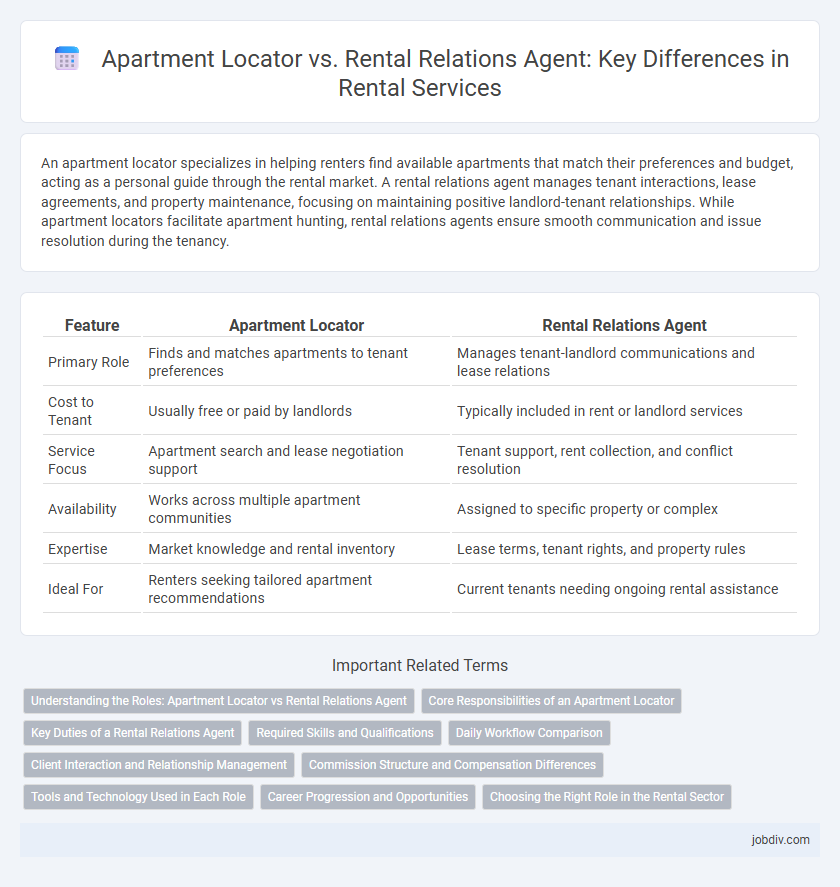An apartment locator specializes in helping renters find available apartments that match their preferences and budget, acting as a personal guide through the rental market. A rental relations agent manages tenant interactions, lease agreements, and property maintenance, focusing on maintaining positive landlord-tenant relationships. While apartment locators facilitate apartment hunting, rental relations agents ensure smooth communication and issue resolution during the tenancy.
Table of Comparison
| Feature | Apartment Locator | Rental Relations Agent |
|---|---|---|
| Primary Role | Finds and matches apartments to tenant preferences | Manages tenant-landlord communications and lease relations |
| Cost to Tenant | Usually free or paid by landlords | Typically included in rent or landlord services |
| Service Focus | Apartment search and lease negotiation support | Tenant support, rent collection, and conflict resolution |
| Availability | Works across multiple apartment communities | Assigned to specific property or complex |
| Expertise | Market knowledge and rental inventory | Lease terms, tenant rights, and property rules |
| Ideal For | Renters seeking tailored apartment recommendations | Current tenants needing ongoing rental assistance |
Understanding the Roles: Apartment Locator vs Rental Relations Agent
Apartment locators specialize in matching prospective tenants with available rental units based on personalized criteria such as budget, location, and amenities, leveraging extensive databases and market knowledge. Rental relations agents focus on managing tenant-landlord interactions, handling lease agreements, resolving disputes, and ensuring compliance with rental policies to maintain tenant satisfaction and property standards. Understanding these distinct roles helps renters navigate the rental process efficiently, benefiting from tailored apartment searches and professional support throughout tenancy.
Core Responsibilities of an Apartment Locator
Apartment locators specialize in matching renters with available apartments that fit their budget, preferences, and needs, leveraging extensive market knowledge and access to multiple property listings. They assist clients by providing personalized recommendations, scheduling tours, and negotiating rental terms to ensure a smooth leasing process. Unlike rental relations agents who focus on managing tenant-landlord communications and property maintenance, apartment locators prioritize finding the ideal rental unit quickly and efficiently.
Key Duties of a Rental Relations Agent
A Rental Relations Agent primarily manages tenant communications, resolves disputes, and ensures lease compliance, which distinguishes their role from an Apartment Locator who focuses on finding suitable rental properties for clients. They handle rent collection, coordinate maintenance requests, and enforce community rules to maintain tenant satisfaction and property standards. Their key duties also include conducting move-in and move-out inspections and facilitating renewal processes to sustain occupancy rates.
Required Skills and Qualifications
An Apartment Locator requires strong market knowledge, excellent communication, and negotiation skills to match clients with suitable rental properties efficiently. Rental Relations Agents need expertise in conflict resolution, tenant law, and property management to handle tenant concerns and lease agreements effectively. Both roles demand customer service proficiency, but Apartment Locators prioritize sales and marketing abilities while Rental Relations Agents focus on mediation and administrative skills.
Daily Workflow Comparison
Apartment locators primarily focus on matching clients with suitable rental properties through market research, client consultations, and property tours, often working independently to maximize client satisfaction. Rental relations agents concentrate on managing tenant-landlord interactions, handling lease agreements, conflict resolution, and maintenance requests to ensure smooth property operations. The daily workflow of apartment locators is client acquisition and property identification, whereas rental relations agents emphasize tenant communication and property management tasks.
Client Interaction and Relationship Management
Apartment Locators specialize in matching clients with available rental properties by actively engaging with tenants to understand their preferences and budget, ensuring personalized housing solutions. Rental Relations Agents focus on maintaining ongoing communication between tenants and property owners, addressing concerns, facilitating lease agreements, and fostering long-term satisfaction. Effective client interaction for Apartment Locators revolves around initial property discovery, while Rental Relations Agents excel in relationship management throughout the lease term.
Commission Structure and Compensation Differences
Apartment locators typically earn commissions paid by landlords based on the rental value, often receiving a percentage of the first month's rent as a finder's fee, which incentivizes quick lease signings. Rental relations agents, employed directly by property management companies, usually receive a fixed salary or hourly wage with possible bonuses tied to tenant retention and lease renewals, focusing on long-term tenant satisfaction rather than upfront leasing commissions. This fundamental difference impacts how each role prioritizes client interactions and contract negotiations within the rental market.
Tools and Technology Used in Each Role
Apartment locators leverage advanced database platforms and AI-driven matching algorithms to quickly connect clients with available rental units that fit their preferences. Rental relations agents utilize property management software and tenant communication tools to efficiently handle lease processing, maintenance requests, and rent collection. Both roles depend on CRM systems but differ in their focus; locators prioritize search optimization while rental agents emphasize tenant service management.
Career Progression and Opportunities
Apartment locators specialize in matching clients with rental properties, often gaining extensive market knowledge and building strong networking skills, which can lead to advancement as senior locators or transition into real estate sales. Rental relations agents manage tenant communications and lease agreements, developing expertise in property management and conflict resolution, paving the way for roles such as property manager or leasing director. Career progression in both fields depends on deepening industry knowledge and cultivating client relationships, offering distinct pathways within the real estate and rental sectors.
Choosing the Right Role in the Rental Sector
An Apartment Locator specializes in helping tenants find rental properties that fit their preferences, leveraging extensive market knowledge and personalized service. A Rental Relations Agent manages tenant-landlord communications, lease agreements, and conflict resolutions, ensuring smooth rental experiences. Selecting the right role depends on whether the focus is client-oriented searching or property management and tenant support.
Apartment Locator vs Rental Relations Agent Infographic

 jobdiv.com
jobdiv.com